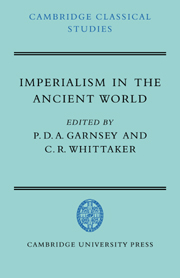Book contents
- Frontmatter
- Contents
- List of figures
- Preface
- 1 INTRODUCTION
- 2 IMPERIALISM AND EMPIRE IN NEW KINGDOM EGYPT
- 3 CARTHAGINIAN IMPERIALISM IN THE FIFTH AND FOURTH CENTURIES
- 4 SPARTAN IMPERIALISM?
- 5 THE FIFTH-CENTURY ATHENIAN EMPIRE: A BALANCE SHEET
- 6 ATHENS IN THE FOURTH CENTURY
- 7 THE ANTIGONIDS AND THE GREEK STATES, 276–196 B.C.
- 8 LAUS IMPERII
- 9 GREEK INTELLECTUALS AND THE ROMAN ARISTOCRACY IN THE FIRST CENTURY B.C.
- 10 THE BENEFICIAL IDEOLOGY
- 11 ROME's AFRICAN EMPIRE UNDER THE PRINCIPATE
- 12 JEWISH ATTITUDES TO THE ROMAN EMPIRE
- Notes
- Bibliography
- Index
3 - CARTHAGINIAN IMPERIALISM IN THE FIFTH AND FOURTH CENTURIES
Published online by Cambridge University Press: 05 June 2014
- Frontmatter
- Contents
- List of figures
- Preface
- 1 INTRODUCTION
- 2 IMPERIALISM AND EMPIRE IN NEW KINGDOM EGYPT
- 3 CARTHAGINIAN IMPERIALISM IN THE FIFTH AND FOURTH CENTURIES
- 4 SPARTAN IMPERIALISM?
- 5 THE FIFTH-CENTURY ATHENIAN EMPIRE: A BALANCE SHEET
- 6 ATHENS IN THE FOURTH CENTURY
- 7 THE ANTIGONIDS AND THE GREEK STATES, 276–196 B.C.
- 8 LAUS IMPERII
- 9 GREEK INTELLECTUALS AND THE ROMAN ARISTOCRACY IN THE FIRST CENTURY B.C.
- 10 THE BENEFICIAL IDEOLOGY
- 11 ROME's AFRICAN EMPIRE UNDER THE PRINCIPATE
- 12 JEWISH ATTITUDES TO THE ROMAN EMPIRE
- Notes
- Bibliography
- Index
Summary
INTRODUCTION
Phoenician colonization of the western Mediterranean from the eighth century B.C. was never a coordinated movement under the direction of a single mother country or state. If therefore Tyre, who was most prominent of the Phoenician colonizers, exercised no direct control over the Phoenician diaspora, neither did Carthage, the new Tyre in the West, inherit any hegemonial role. Carthage began as merely one of a number of colonies, founded almost certainly after Gades and Utica but, like other western Phoenicians, in response to pressures at home and in quest of land on which to settle in the West. Tradition, which is probably correct, gave to Carthage only one distinctive feature from the rest – a restricted territory. From the start Carthage was bound by a compact with her Libyan neighbours to remain confined to a narrow neck of land, the Megara, and checked from expanding into her natural hinterland of Cape Bon (e.g. Justin 18.5.14; Livy 34.62.12).
For a long period this was the condition which pertained. As the colony grew in size she was compelled to seek beyond her confines for food and for land for her surplus population. Already in the mid-seventh century B.C. archaeology has revealed that she established a trading presence on the corn-rich Syrtic coast of Africa. And according to Diodorus (5.16), she sent out her own first colony to Ibiza in 654 B.C.
- Type
- Chapter
- Information
- Imperialism in the Ancient WorldThe Cambridge University Research Seminar in Ancient History, pp. 59 - 90Publisher: Cambridge University PressPrint publication year: 1979
- 9
- Cited by

